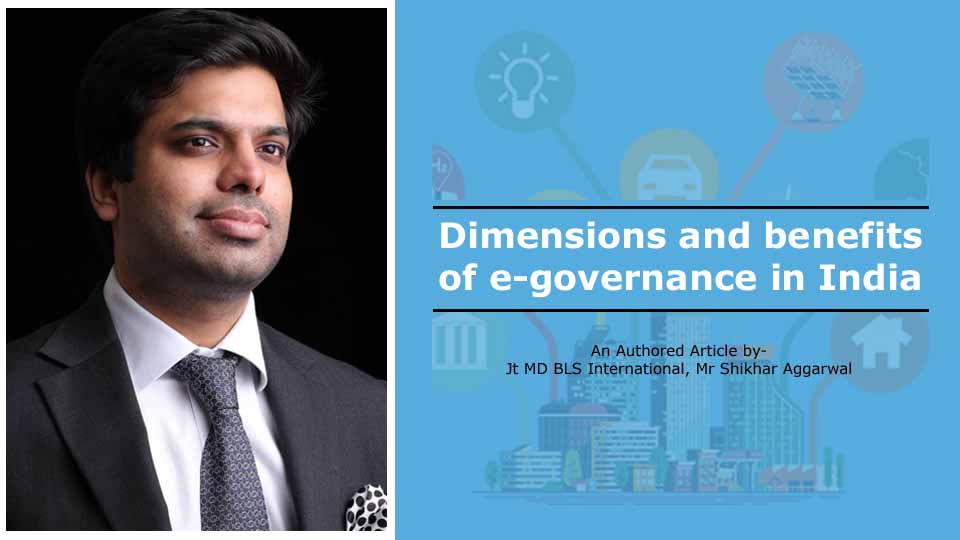
Dimensions and Benefits of e-Governance in India
Due to the rapid use of technology and digitization, Governments all over the world are initiating steps to involve technology in all governmental processes, this has led to the emergence of ‘e-government’. In a democratic nation like India, e-governance should enable seamless access to information across the state and central government but implementing the same for one billion people is a challenge.
Citizens expect speedy service, courteous treatment, and quick disposal of grievances or applications.In addition, they also expect flexible, convenient interactions, sophisticated online services, and prompt responses to their requests. Increasingly frustrated by the complexity, the need to visit multiple locations, and the need to execute multiple transactions to satisfy simple requests, citizens now demand 24×7 access and rapid resolution. But the expense to provide traditional services and to extend round-the-clock availability to those services can be enormous.
There is, therefore, a wide gap between the expectations of the citizens and their experience with the government. This gap can only be filled by drastic simplification of procedures and outsourcing of E-governance services to private players.
Private partners can help government by providing expert support. Worldwide, such partnerships are often essential to the efficient, speedy and sustainable design and delivery of e-government services and programmes. The ultimate objective of e-Governance is to reach out to citizens by adopting a Lifecycle approach i.e. providing public services to citizens which would be required right from birth to death, be it issuance and renewal of Birth & Death Certificate, Identity Card Services, Aadhar and Passport related services, Payment of Property Tax, Affidavit Attestation, Bus Passes, Electricity Bill Payment and several other services.In India, however, it is still a nascent concept.
Benefits of outsourcing e-Governance
1. Better access to information and quality services for citizens:Implementation of technology and outsourcing to experts would ensure availability of timely and reliable information on various aspects of governance. As regards services, there would be an immediate impact in terms of savings in time, effort and money, resulting from online and one-point accessibility of public services backed up by automation of back end processes.
2. Simplicity, efficiency and accountability:Outsourcing would result in simplification of the functioning of government, enhanced decision-making abilities and increased efficiency across government – all contributing to an overall environment of a more accountable government machinery. There would be easy access to services, single window/one-stop shop, 24×7 convenience, flexibility in the choice of access methods and devices and unity of responsibility leading to improved delivery of public services
3. Expanded reach of e-governance:Outsourcing would help in bringing government machinery to the doorsteps of the citizens. Expansion and strengthening of communication infrastructure would facilitate smooth delivery of large number of services. It reduces bureaucracy and enhances the quality of services in terms of time, content and accessibility through integrated service delivery platforms at the door steps of citizen.
4. Enabling Environment for Promoting Economic development –Rendering services to private players enables government to create positive business climate by reducing administrative steps and allowing the government to concentrate on what it is good at. It further minimizes financial outgo, increases efficiency in management and better exploitation of government assets and data.
In regard to the above cited services, what people expect from a responsible Government is to garner a blend of cost-effective and time-bound services, transparent policy, no third-party intrusion and a corruption-free work structure.Thanks to the enormous support and endeavour of the Punjab state government, the dream project of E- governance in the state has been fulfilled.
With 354 Kendras offering more than 250 citizen services of various Government Departments and serving 66% of the state’s population, Punjab has become the epitome in the said domain and a true testimony to the above benefits. The Kendras have processed more than 17 million applications till date, which is an accomplishment and a sheer indication of the extent of faith that the people of Punjab have in these services.
Being the single-point of contact, all these Kendras are setup in a close proximity, which has not only curbed down the travel time of every citizen in the state but also made the citizen services available for them in a hassle-free manner.
In addition to being a trustworthy E-governance service provider, these Sewa Kendras have enriched the livelihood of thousands of people in the state who are working in these Kendras and it includes 25% women workforce and 1% handicapped individuals.
With incessant progress and faith amongst the citizens of Punjab regarding good governance, it is expected that in coming one year, entire population of the state would start visiting these Kendras for fulfilling their varied government documentation requirements. The flourishing E- governance services in Punjab is an example for other states in the country as well.
